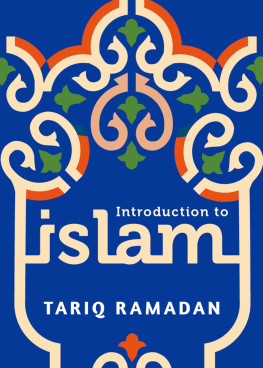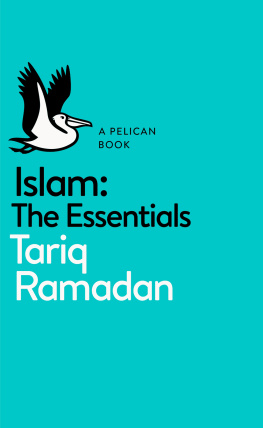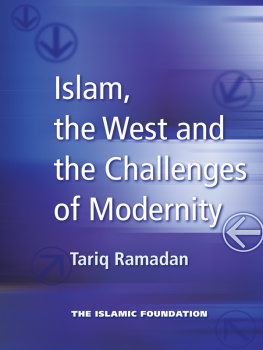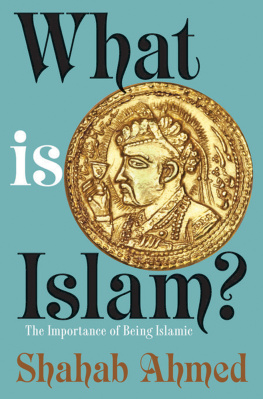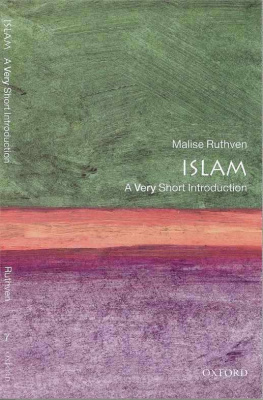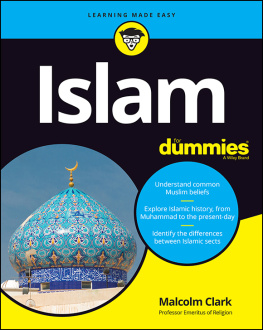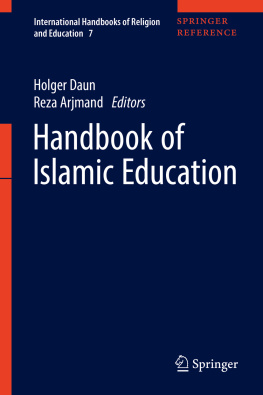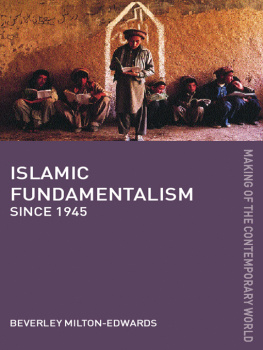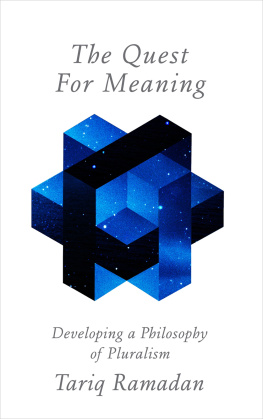Hisham M. Ramadan - Understanding Islamic Law (Contemporary Issues in Islam)
Here you can read online Hisham M. Ramadan - Understanding Islamic Law (Contemporary Issues in Islam) full text of the book (entire story) in english for free. Download pdf and epub, get meaning, cover and reviews about this ebook. year: 2006, publisher: AltaMira Press, genre: Religion. Description of the work, (preface) as well as reviews are available. Best literature library LitArk.com created for fans of good reading and offers a wide selection of genres:
Romance novel
Science fiction
Adventure
Detective
Science
History
Home and family
Prose
Art
Politics
Computer
Non-fiction
Religion
Business
Children
Humor
Choose a favorite category and find really read worthwhile books. Enjoy immersion in the world of imagination, feel the emotions of the characters or learn something new for yourself, make an fascinating discovery.
- Book:Understanding Islamic Law (Contemporary Issues in Islam)
- Author:
- Publisher:AltaMira Press
- Genre:
- Year:2006
- Rating:5 / 5
- Favourites:Add to favourites
- Your mark:
- 100
- 1
- 2
- 3
- 4
- 5
Understanding Islamic Law (Contemporary Issues in Islam): summary, description and annotation
We offer to read an annotation, description, summary or preface (depends on what the author of the book "Understanding Islamic Law (Contemporary Issues in Islam)" wrote himself). If you haven't found the necessary information about the book — write in the comments, we will try to find it.
Understanding Islamic Law (Contemporary Issues in Islam) — read online for free the complete book (whole text) full work
Below is the text of the book, divided by pages. System saving the place of the last page read, allows you to conveniently read the book "Understanding Islamic Law (Contemporary Issues in Islam)" online for free, without having to search again every time where you left off. Put a bookmark, and you can go to the page where you finished reading at any time.
Font size:
Interval:
Bookmark:
Series editor : Aminah Beverly McCloud, DePaul University
Most contemporary books on Muslims tend to see Islam as an exotic, backward, medieval, violent, misogynist tradition that just does not fit with the modern world. Others are simplistic rebuttals of this Islamophobia. The goal of this series is to fill in the gaps of knowledge with accurate information on contemporary issues and comprehensive summaries of the foundations of the Islamic worldview. With this goal in mind, this series explores many aspects of Islam and Muslim life including: both the fundamentals of Islam and Muslim engagement of contemporary issues in Muslim practice, Muslim communities, economics, medicine, law, new configurations of the geography of the Muslim and Islamic worlds, contemporary issues in the Arab world and among Arabs in America, Muslim reform movements in America and in the Muslim world. While this series aims to be comprehensive, it does not claim to be exhaustive. The series seeks to make complex issues comprehensible while still engaging for both students in various disciplines and general readers.
Books in the series
Understanding Islamic Law , edited by Hisham M. Ramadan
Forthcoming titles include
Islam, Health, and Medicine , edited by Hamada Hamid
Islam, Management, and Finance , edited by Rafik Beekun

ALTAMIRA PRESS
A division of Rowman & Littlefield Publishers, Inc.
A wholly owned subsidiary of The Rowman & Littlefield Publishing Group, Inc.
4501 Forbes Boulevard, Suite 200
Lanham, MD 20706
www.altamirapress.com
PO Box 317
Oxford
OX2 9RU, UK
Copyright 2006 by AltaMira Press
All rights reserved . No part of this publication may be reproduced,
stored in a retrieval system, or transmitted in any form or by any
means, electronic, mechanical, photocopying, recording, or otherwise,
without the prior permission of the publisher.
British Library Cataloguing in Publication Information Available
Library of Congress Cataloguing-in-Publication Data
Understanding Islamic law: from classical to contemporary / edited by Hisham Ramadan.
p. cm.(Contemporary issues in Islam)
Includes bibliographical references and index.
9780759114340
1. Islamic law. I. Ramadan, Hisham M. II. Series.
KBP144.U53 2006
340.59dc22
2005031797
Printed in the United States of America
 The paper used in this publication meets the minimum requirements of American National Standard for Information SciencesPermanence of Paper for Printed Library Materials, ANSI/NISO Z39.481992.
The paper used in this publication meets the minimum requirements of American National Standard for Information SciencesPermanence of Paper for Printed Library Materials, ANSI/NISO Z39.481992.
Aminah Beverly McCloud
Today, texts on Islam and Muslims are generally focused either on rebuttals to Islamophobia, terrorism and analyses of Muslim reform groups, whats wrong with the Islamic religion, Arab Muslim women, the problems in Muslim societies, or the problems Muslim societies have with modernity. Yesterdays texts on Islam and Muslims present Islam as a medieval religion of an extremely exotic nature that oppresses women, whose members are antimodern, violent, and backward. Readers of either set of texts find that they actually finish reading with opinions on what they read but with little knowledge of Islam as a worldview and even less knowledge of the diverse opinions of over a billion people living all over the globe and their participation in their own modernities. The goal of this series is to fill in the gaps of knowledge with accurate information on contemporary issues and comprehensive summaries of the foundations of the worldview.
With this goal in mind, this series explores many aspects of Islam and Muslim life including: both the fundamentals of Islam and Muslim engagement of contemporary issues in Muslim practice; Muslim communities, economics, medicine, and law; new configurations of the geography of the Muslim and Islamic worlds; contemporary issues in the Arab world and among Arabs in America; and Muslim reform movements in America and in the Muslim world. While this series aims to be comprehensive, it does not claim to be exhaustive. Writing styles and analyses, seek to make complex issues comprehensible while engaging for both students in various disciplines and general readers.
The first text in this series is on the law. The Shariah (Islamic law) is a little understood yet critical facet of the Islamic worldview. The operative aspects of Islamic law are contained in fiqh (Islamic jurisprudence). Editor Hisham Ramadan, an accomplished criminal lawyer and Islamic Law professor, provides readers with a variety of texts written by scholars on a number of concerns including an overview of the law, Islamic treatment of punishment, intellectual property, and marriage and divorce issues. This particular volume is a template of other volumes in this series as scholars engage the tradition and its modern, contemporary uses.
Hisham M. Ramadan
Nay, We hurl the Truth against falsehood, and it knocks out its brain, and behold, falsehood doth perish! Ah! woe be to you for the (false) things ye ascribe (to Us).
The Holy Quran 21:18
O mankind! We created you from a single (pair) of a male and a female, and made you into nations and tribes, that ye may know each other (not that ye may despise each other). Verily the most honored of you in the sight of Allah is (he who is) the most righteous of you. And Allah has full Knowledge and is well-acquainted (with all things).
The Holy Quran 49:13
The purpose of this book is to explain several aspects of Islamic jurisprudence fundamentals to the common reader in order to acquaint him with ideologies that are far from his zone of accessible knowledge. The essays presented in this volume were carefully selected to cover several areas of Islamic jurisprudence. Irshad Abdal-Haqq, in chapter 1, lays this volumes foundation by explaining the sources and elements of Islamic law, Islamic major schools of jurisprudence and essential definitions. In chapter 2, I attempt to capture the essence of Islamic criminal law by demonstrating the objectives of Islamic criminal law, its rationales, and the characteristics of the punishment. Ahmed Zaki Yamanais chapter on international humanitarian law is of utmost importance at the present time, when a number of individuals invoke Islam as a justification for shocking acts of terror, because the essay demonstrates the genuine Islamic ethics of warfare. Professor Noor Mohammeds chapter 4 may assist the reader to understand the essentials of Islamic contract law in a time when a growing number of Muslims are seeking Islamic financial services in the West, and there is a rapid increase in the implementation of the Islamic financial system by many Islamic states.
While Mahmoud Hoballah explains the basics of Islamic family law in chapter 5, Professor Nazeem Goolam clarifies common Islamic family law misunderstandings. The merit of his chapter 6 is not limited to vindication of certain Islamic law positions but also extends to educate numerous Muslims of the true spirit of Islamic law. Professor Ali Khan, in chapter 7, presents a theory on Islam as intellectual property whose significance extends far beyond excellent creativity in academic exercises to raise the question of the validity of the orientalists analysis of Islamic law. I conclude this volume by including two highly important documents: The Islamic Universal Declaration of Human Rights and The Constitution of Medina supplemented by a commentary. The latter document presents the first constitution made by the Prophet Mohammed in establishing an Islamic state in Medina. The former document, as drafted by the European Islamic Council, a nongovernmental organization, highlights Muslim efforts to codify Islamic human rights apart from oppressive regimes, in a number of states populated by a Muslim majority, and from Western ideologies that might be inconsistent with Islamic law.
Font size:
Interval:
Bookmark:
Similar books «Understanding Islamic Law (Contemporary Issues in Islam)»
Look at similar books to Understanding Islamic Law (Contemporary Issues in Islam). We have selected literature similar in name and meaning in the hope of providing readers with more options to find new, interesting, not yet read works.
Discussion, reviews of the book Understanding Islamic Law (Contemporary Issues in Islam) and just readers' own opinions. Leave your comments, write what you think about the work, its meaning or the main characters. Specify what exactly you liked and what you didn't like, and why you think so.



